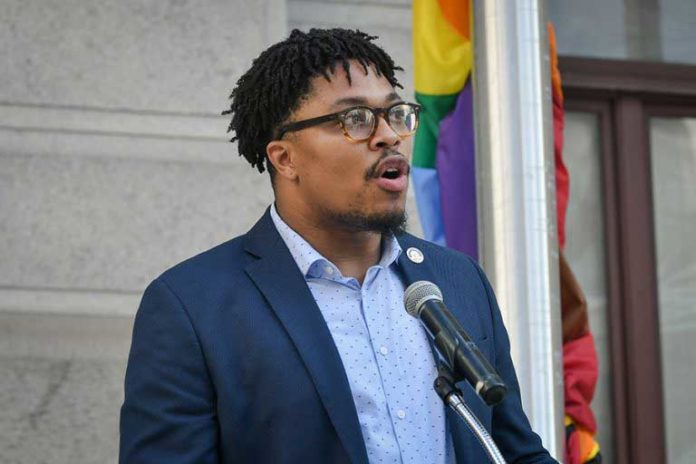On Saturday, April 30, out California Sen. Scott Wiener kicked off a nationwide Zoom town hall with other out elected officials to discuss the impacts of COVID-19 on the LGBTQ community. Those LGBTQ leaders included in the town hall were Pennsylvania Rep. Malcolm Kenyatta, New York Sen. Brad Hoylman, Colorado’s Gov. Jared Polis, and California Assemblymember Susan Talamantes Eggman. With slashed state budgets and a serious lack of data, these leaders expressed growing concern over issues concerning the LGBTQ community during this pandemic.
Sen. Wiener led with the caveat that research on the LGBTQ community’s COVID-19 impact is severely lacking. Lack of data means a slightly distorted picture of what the real impact may be. On the issue, Pennsylvania’s Rep. Kenyatta repeated the adage that, “If you don’t know where it hurts or how much it hurts, you’ll never fix what hurts.’” Because of this, Rep. Kenyatta introduced a bill called Data for LGBTQ Live. “It would put a question on all state forms,” said Rep. Kenyatta, “where we are collecting demographic information to begin that important process of trying to quantify the impact of some of these terrible things that are happening in our community. As we all know, there really is a desert of good, quality data as it relates to our community, particularly at the state level.”
Just after this national town hall, New Jersey Assemblymember Valerie Vainieri Huttle pledged to introduce legislation requiring hospitals in the Garden State to report data on sexual orientation and gender identity as it relates to COVID-19. “While New Jersey has made great strides to ensure that we are collecting data on the racial implications of this crisis,” said Assemblymember Huttle, “I believe that we must also take action to better understand how this pandemic has impacted the LGBTQ community in our state. The bottom line is, we cannot advocate for resources without fully understanding the scope of the problem; this legislation will help to ensure that resources and support will be directed towards those who need them most during this critical time.”
Lack of research aside, Gov. Polis reminded everyone that much is being overshadowed by one case currently on hold in the United States Supreme Court due to COVID-19 shutdowns. SCOTUS is expected to deliver a decision on Zarda v. Altitude Express and EEOC v. R.G. & G.R. Harris Funeral Homes, which will dictate federal law on if employers can discriminate on a basis of sexual orientation or gender identity under Title VII. If it is decided that sexual orientation and gender identity are not protected under Title VII, Gov. Polis said it would be a major setback.
As LGBTQ Americans wait for the SCOTUS decision, there are a significant number of issues that affect the community. Many allusions were made to the HIV/AIDS pandemic and what lessons can be applied to the current pandemic. “Our community went through a plague,” said Rep. Wiener. One leftover from the AIDS pandemic is the FDA’s restriction on blood and plasma donations from men who have sex with men. On April 2, the FDA relaxed its rule and allowed men who have sex with men to only wait three months instead of one year before their last sexual encounter. According to Assemblymember Eggman, this law is still antiquated: “Just the fact that the timeline keeps going down pretty much tells us that it’s an old policy and that it’s on its way out. Hopefully, with [COVID-19], it’ll give it this extra push it needs. With a nationwide blood shortage, it just becomes more and more ridiculous to people. The LGBTQ community has been aware of the restrictions for a long time, but the larger public hasn’t. So, I think the more conversations we have about this, the better.”
Due to state-imposed quarantines, Sen. Wiener and Sen. Hoylman expressed concern about the great toll isolation is paying on LGBTQ youth and seniors. Sen. Wiener said, “I’m worried about LGBTQ youth who are at home with maybe an unsupportive family.” Because LGBTQ centers are closed and many Pride events are canceled or postponed, Sen. Wiener made the point that young LGBTQ folks reliant on those social programs would be especially hard hit. Additionally, Sen. Hoylman brought up LGBTQ seniors who may be isolated at home. These people are less likely to have children to depend on for help, said Sen. Hoylman, and they may have lost large swaths of their communities in the 80s and 90s due to HIV/AIDS.
Though there was no discussion of concrete legislation currently being proposed to help alleviate many of these concerns, Assemblymember Eggman pointed to LGBTQ history as inspiration going forward. “We have been a marginalized community for so long,” said Assemblymember Eggman, “and we have been in this fight and been consistent and civil [throughout]. We have been in a pandemic now for eight weeks and there are some for whom that has been too much of a burden and they have to take guns and go try to shut down a government. When you look at that as opposed to our history, I think we should all feel very proud.”
As the town hall came to a close, Sen. Hoylman took out his megaphone. It was 7 p.m. in New York. He switched on the megaphone and pointed it out the window: “Thank you, healthcare workers!”
